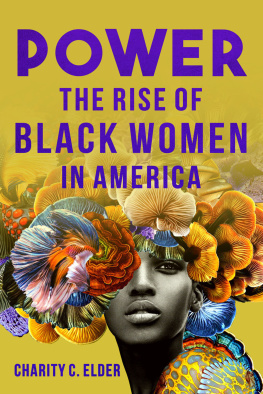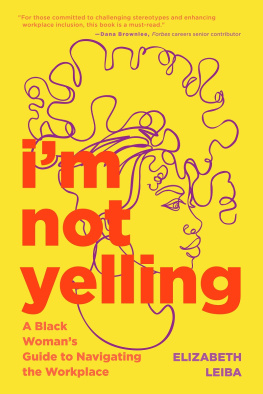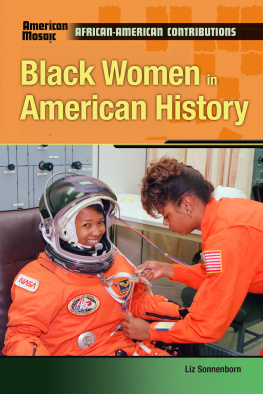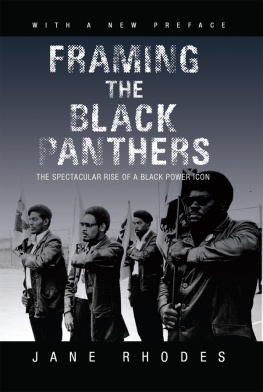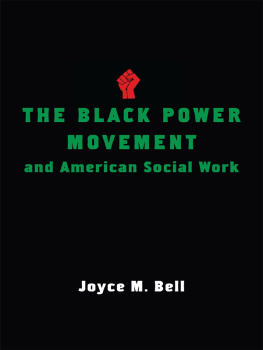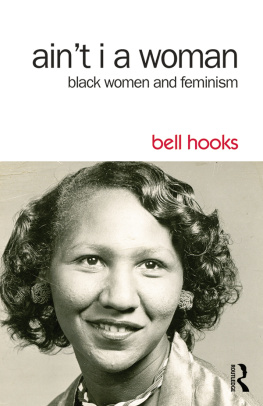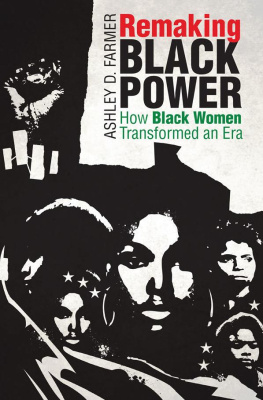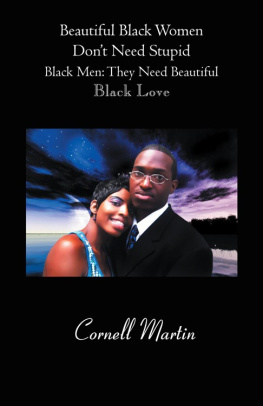
Advance Praise forPower
In Power, Charity C. Elder provides a captivating case for the dopeness of Black women. Daring to reconsider past and contemporary realities beyond the gaze of oppression, Power uses soul stirring narratives and empirical data to illuminate our historical rise and shares fresh theories for how Black women manage to thrive in a twenty-first century context.
Timeka N. Tounsel, author of Branding Black Womanhood: Media Citizenship from Black Power to Black Girl Magic
Power explores the sociological evolution of understanding the development and expansion of Black womens acquisition of agency in America. Charity C. Elders award-winning background prepared her to masterfully encapsulate the intersectional nuances of research and introspective analysis to interact with a diverse palate of readers. Elder births a new definition of Dopeness to transform the historical association of Black women lacking to create a new-aged literary presentation of Black womens pearls. Power delivers Black women a new way to ruminate their position in society and unapologetically explore avenues toward purpose and success, demonstrating why black women truly do lead.
Glynda C. Carr, president & CEO, Higher Heights for America
Power is the right book, with the right message for right now. It is an important book that shatters stereotypes and proves for the first time just how far Black women have come. Beautifully written, Power is a story of resilience and hope. I recommend that every Black woman, all women of color, read this book.
Minda Harts, Workplace & Equity consultant and bestselling author of The Memo
Power is the bouquet of flowers Black women have long deservedan acknowledgment of all we have overcome and all we have achieved in spite of unparalleled challenges. It never shies away from the reality of the hardships we continue to face today but it gives us a moment to exhale at last. To reflect. To heal. To put down the heavy load for a moment and stand back and look at the garden of our lives and celebrate the bounty. It made me feel seen, and I know so many of my fellow sisters will feel seen as well. Above all, it was a much needed and comforting reminder that there is so much hope for our futures and the futures of our daughters.
Mandi Woodruff-Santos, award-winning cohost of Brown Ambition and founder of the MandiMoney Makers
In this compelling debut, Elder pens a meditation that celebrates African descended womens everyday strength, resilience, and determination to succeed, along with their expressions of joy, love, and excellence in a world that isnt always just. Elder writes about the ways Black women be knowing, which goes beyond the typical narrative of depravity wrought by white supremacy and reveals elements of truth-telling that happens at the nexus of Blackness and womanism. This book is a call-to-action for deeper conversations about where society can go and how we can get there when we stop oppressing and start protecting Black and Brown women.
Yndia Lorick-Wilmot, sociologist and podcast host of Talking Journeys of Belonging 2 Blackness


Copyright 2022 by Charity C. Elder
All rights reserved. No part of this book may be reproduced in any manner without the express written consent of the publisher, except in the case of brief excerpts in critical reviews or articles. All inquiries should be addressed to Skyhorse Publishing, 307 West 36th Street, 11th Floor, New York, NY 10018.
Skyhorse Publishing books may be purchased in bulk at special discounts for sales promotion, corporate gifts, fund-raising, or educational purposes. Special editions can also be created to specifications. For details, contact the Special Sales Department, Skyhorse Publishing, 307 West 36th Street, 11th Floor, New York, NY 10018 or .
Skyhorse and Skyhorse Publishing are registered trademarks of Skyhorse Publishing, Inc., a Delaware corporation.
Visit our website at www.skyhorsepublishing.com.
10 9 8 7 6 5 4 3 2 1
Library of Congress Cataloging-in-Publication Data is available on file.
Cover design by Kai Texel
Cover art Carol Muthiga-Oyekunle/Lolita Lorenzo Art
Author photo by Hannah Forero
Permission to use How I Got Over lyrics granted by Clara and Willa Ward Publications and Estate of Jay B. Ross
Print ISBN: 978-1-5107-7002-7
Ebook ISBN: 978-1-5107-7084-3
Printed in the United States of America
To the Black women who taught me about sisterhood...
rebecca chaundreia elder
my big sister
a dope black woman
donalyn elnora elder
my baby sister
poet, writer & consummate advocate for the underdog
(19792006)
I am the dream and the hope of the slave.
I rise
I rise
I rise.
Still I Rise | Maya Angelou, 1978
The new dawn balloons as we free it. For there is always light, if only were brave enough to see it. If only were brave enough to be it.
The Hill We Climb | Amanda Gorman, 2021
we are the ones we have been waiting for
Poem for South African Women | June Jordan, 1978
CONTENTS
PREFACE
A BLACK WOMANS GAZE
T his is the best time in America to be a Black woman.
I was in conversation with a former Newsweek editor; a white man in middle-age. By the look on his face, I could see that my words shocked him. I saw the puzzlement, incredulity. He said he was surprised. But his eyes seemed to go further, to say what his mouth did not: How can you or any Black woman be so confident and self-assured at this time?
It was late November 2016. Donald J. Trump was president-elect of the United States.
Half the country was inconsolable. The other half ebullient. At the time, I was an executive producer attending an after-work event on the rooftop of a Manhattan hotel, hobnobbing with compatriots in the business of reporting.
The citys lights shone brightly against the blue-black sky. But Manhattan, with its large democratic base, was shrouded in a thick, invisible funk. The 2016 presidential election season had been onerous; marked by white nationalism, misogyny, xenophobia, and high rates of police officers killing and brutalizing Black people.
I dont recall exactly what the journalist said to prompt my declaration, but I distinctly remember an urge to give voice. To center my narrative. To articulate my Black womans gaze.
Black women are dope: dope as an adjective, not as a noun or verb; dope in Black urban parlance. During the late 1980s and early 1990s, in inner cities from Los Angeles to the Bronx, the definition of dope expanded from being synonymous with illicit drugs to being an adjective describing something or someone to be emulated, admired, and even envied.
Dopeness is not akin to Black Girls Rock or Black Girl Magic, which are terms that have become so ubiquitous theyve lost real meaning. Dopeness is not a catchphrase to be memed on Twitter, tatted on a forearm, or spray painted on a city block. Nor is it synonymatic with Strong Black Woman, a toxic trope that dehumanizes and reduces Black women to workhorses and fixers absent of humanity, fragility, or vulnerability.
Next page
